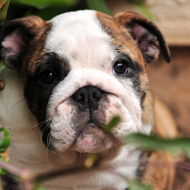
BVA urges a revision of breed standards
Cross-breeding of the English bulldog is required to make sure the breed survives, according to new research.
A study published in Canine Genetics and Epidemiology suggests the selective nature of breeding for physical traits - like skin folding and child-like appearance - has made bulldogs so inbred they cannot be returned to health unless new blood lines are introduced.
The researchers say the Olde English Bulldogge, a recently created American dog breed, 'will help bring the breed into compliance'.
Speaking to BBC News, study co-author Niels Pedersen said: "We tried not to be judgemental in our paper. We just said there's a problem here, and if you are going to decide to do something about it, this is what you've got to work with.
"If you want to re-build the breed, these are the building blocks you have, but they're very few. So if you're using the same old bricks, you're not going to be able to build a new house."
Centuries of selective breeding has led to an array of health problems in the bulldog. Their distinctive muzzle, for example, has led to difficulties in breathing, which is the primary cause of sickness and mortality in the breed.
Other common problems include skin allergies, reproductive issues and mobility problems.
In response to the new research, BVA president Sean Wensley issued a statement urging a revision of breed standards to protect animal welfare.
"The research released today reflects the seriousness of the health problems associated with English bulldogs that our members are seeing in practice," he said.
"Revision of breed standards, to include evidence-based limits on physical features such as muzzle shortness, and full consideration of other approaches such as outcrossing, are now needed to ensure high-risk breeds, such as the English bulldog, do not continue to suffer unnecessarily."
In the study, Professor Pedersen and his team analysed the DNA of 102 registered English bulldogs to determine its genetic diversity. However, the study revealed extremely low levels of diversity resulting from a small founder population and artificial genetic bottlenecks.
The researchers say that returning the breed to health without further decreasing existing genetic diversity is 'questionable'.



 The Animal and Plant Health Agency (APHA) has updated its online reporting service for dead wild birds.
The Animal and Plant Health Agency (APHA) has updated its online reporting service for dead wild birds.